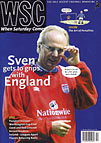 The Worthington Cup final was widely seen as a potential watershed for Liverpool. John Tandy was more interested in what it meant for Birmingham
The Worthington Cup final was widely seen as a potential watershed for Liverpool. John Tandy was more interested in what it meant for Birmingham
“Not a cat’s chance in hell”– that’s my favourite way to approach a football match. When you’re so far out the running that anything short of abject humiliation will do quite nicely. The Worthington Cup final fitted the bill. The prevailing mood in Birmingham was that of gratitude: we were just glad to be there, glad of a crumb of attention for a change. The weekend was always going to be more of a carnival than a riot, and with arrests in Cardiff city centre both Saturday and Sunday seemingly somewhere below average, a record police presence for the final seemed a tad superfluous, even given Birmingham’s occasionally shady past.
The match followed the right pattern too. We didn’t look daft, didn’t do much wrong, and losing to a goal like Robbie Fowler’s would have been positively honourable. Then came the 93rd minute when Henchoz upended O’Connor. Suddenly there’s that horrible wrench in your gut… “Oh shit, we’re in with a shout”.
Suddenly, if you blow it you’ll be gutted… Why can’t you just learn tokeep in your place? Fortunately Darren Purse, Birmingham’s most improved player this season, did the business from the spot (it’s not been one of our conspicuous successes lately). Now we could fall to pieces and still be proud. Times have changed at St Andrews, though. We don’t fall apart quite like we used to. An evolution so gradual you’d be forgiven for missing it is slowly turning Birmingham City into Contenders. The club’s owners have made investments in both set-up and team while conspicuously refusing to throw money at either.
This has led to accusations from time to time that they lack ambition, but has actually prevented the twin pratfalls of spending pots of dough unwisely (Arthur Cox at Derby, Mark McGhee at Wolves) or of building success too fast to be sustained (Blackburn). Instead the squad has evolved organically, allowing weak links to emerge and be strengthened piece by piece. Transfer mistakes have been put right and there’s rarely a moment your heart sinks when they read out the team.
The second factor has been the evolution in the stature of Trevor Francis as a manager. Again, this has been gradual, his status as the fans’ hero probably buying him time an incomer would have been denied. He is now, remarkably, the club’s second-longest-serving postwar manager. The Francis that arrived in 1996 seemed cold, aloof. He had such reservations about the job you wondered if he wanted it at all. It was only after the play-off defeat on penalties against Watford in 1999 that he spoke for the first time of defeat actually hurting.
In 2000 we made the play-offs again, when replacing centre back Purse with left wing Peter Ndlovu at half-time in the first leg created the space that gave Barnsley the scope to score at will. It was learning from this strategic suicide, however, that led to the strategy that defeated Ipswich in the Worthington semi-final. Francis’s interview with Ron Atkinson recently had him telling tales of derring-do against the Villa that were BCFC populism at its best, while his regret over the Martin Allen incident at QPR (he fined the player for attending the birth of his son) showed just how much he had mellowed.
Hence the defining picture from the Millennium Stadium was Francis, his arms father-like round 19-year-old Andrew Johnson, who, having all but won the game in extra time, finally lost it when his penalty was saved. So it didn’t work out quite as planned. There were hefty and painful chunks of extra time where it looked like we might just swing it. There was the strain of a shoot-out. But we turned up and we weren’t embarrassed. Liverpool clearly hope this is the start of something big for them. And, you never know, maybe for us too. Next time may be less than 38 years away.
From WSC 170 April 2001. What was happening this month